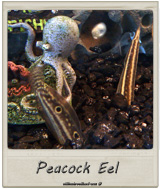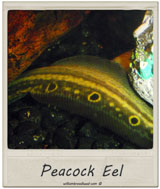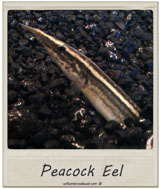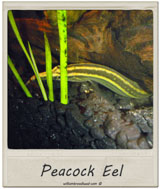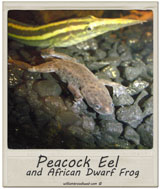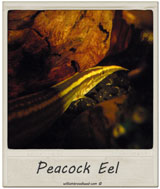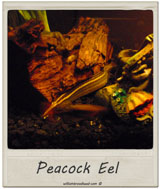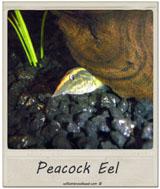- Home
- » Articles
- » Our Aquarium
- » Peacock Eel
Peacock Eel
Peacock Eel (Macrognathus siamensis) (Striped Eel, Siamese Eel)
Latin:Macrognathus siamensis
Family: Mastacembelidae (Spiny Eel family)
Usually Fine With Community Fish
Diet: Frozen & Live Bloodworm, Blackworm, [Freeze-dried]
Maximum size: 13"
Water temperature: 72-82° F
Swimming level: Bottom
Experience level: Intermediate
Tank Setup: 20 to 30+ gallons, moderately planted, plus hiding & sufficient substrate
How We Got Our Eel Back
When we got our new 20 gallon tank in early 2010. I took Piers to pick out some new fish. The first fish Piers picked out (AFTER the giant African Knife fish which we did not get) was a Peacock Eel.
Okay, a Peacock Eel. I was not too keen on the idea of having a 12 inch eel in the tank. But after talking with the people at Petsmart (there are a couple people there who seem particularly knowledgable about their fish), I figured we would try it.
Eel Lore
Here is a synopsis of what I have found out about eels:
Eels, or rather spiny eels as the Peacock Eel is, are not true "Eels". They are fish that strongly resemble Eels but are missing a few things that would make them eels, like bones, real teeth, and they have too many actual fins, like a fish. And I *think* true eels are salt water only. These eels are fresh to brackish estuary lovers.
Do not worry about them breeding if you get more than one. First, it is apparently very hard to tell male from female, an secondly, from what I have read, there are no known cases of captive bred Asian/Peacock Eels. The conditions they need are apparently too subtle/difficult to replicate in captivity. Unless you own an Asian river, perhaps.
Freshwater eels should share their aquarium with other fish that are the same size or larger. They do not tend to get along with other eels (same species if find). Due to their size, eels should be in a long and/or large aquarium. The minimum aquarium size should be 29 gallons, but preferably 55 gallons or more. A good rule of thumb is one gallon of water for every one inch of full-grown fish. For us, a 10 inch eel took half the 20 gallon tank. Eels like fine gravel or sand substrate on the bottom of the aquarium, as they often burrow into the sand. They are by nature predominantly secretive rock dwellers. Thus make sure your aquarium has many hiding places such as large stones, rockwork, et al.
Plants and Eels
A warning about plants in your aquarium with eels: Since eels love to hide in the substrate, place your live plants in the corners or use potted plants to prevent uprooting. Generally, our eel liked a few key spots that he would burrow under the substrate and under one of the wood pieces. We have two wood pieces that had aquatic plants grown into them. These work pretty well and even if they shift a little it does not disturb the plants in the wood.
Now here is the deal with our eel. One, it survived nearly one (1) year in our 20 gallon tank. The first month it would hide in the substrate much of the time with just its beak sticking out. Occasionally you would find it half in half out. Occasionally you could not find it for the better part of a day, but it would reappear a few hours later. After about two or three months, it seemed pretty comfortable and you could catch it swimming out and about frequently or lounging about on the bottom of the tank. It usually would hide if it saw you come in the room, but with the tank light on at night and the room light out, you could watch it swim about up close.
Feeding
Feeding this guy was... well, I NEVER saw it eat. I have read/heard they are very picky, and I tried everything, but I never saw it actually put anything in its mouth. I tried frozen bloodworm, frozen shrimp, crickets (yes, i tried crickets), ghost shrimp, snails, guppies. And of course, all kinds of flakes and pellets. And yes, I tried the bloodworm with a big turkey basting dropper thing to get the food right down to it (it seems if you don't do that, the other fish will eat almost all the bloodworm long before it hits the bottom of the tank -- fish LOVE that stuff!). But still, never saw anything go in its mouth.
But it lived long enough and seemed to actually grow and get fatter, so it was eating SOMETHING. I suspect it at my neon tetras, maybe the ghost shrimp, maybe some of the other fish. And maybe some of the food. I also suspect it ate the little snails (common snails) that hitchhike on plants. But I don't know.
Was it Happy?
Perhaps it would have been happier in a bigger tank, but it didn't seem to mind. But not so very long ago, one day it burrowed down and we have never seen it since. I have a long metal rod to kind of move things around in the tank. After a few weeks, I took it and carefully drug it through the substrate to see if the eel was actually in the tank. I could find no trace of it! So it either died and dissolved and is now part of the muck in the substrate, or it pulled a Nemo and is out there somewhere swimming free. But that second case is not too likely.
So rest in peace little eel. It was a pretty little creature. We will always remember you!
Do It Again? In A 20 Gallon Tank?
Would I get another one? Petsmart doesn't seem to carry these anymore. And I haven't really looked anywhere else as I think until I decide we are ready to graduate to bigger tank, I don't think I would try an eel again in a 20 gallon.
CachedSince:{ts '2025-07-12 02:34:35'}
